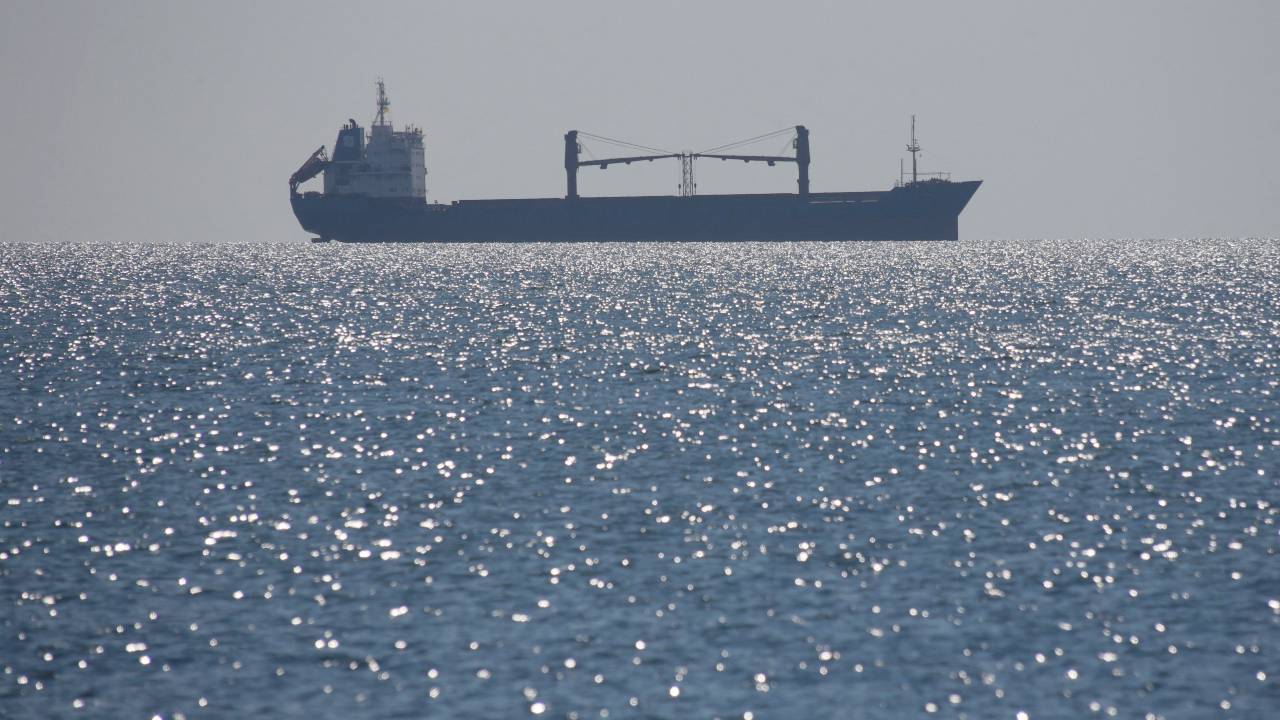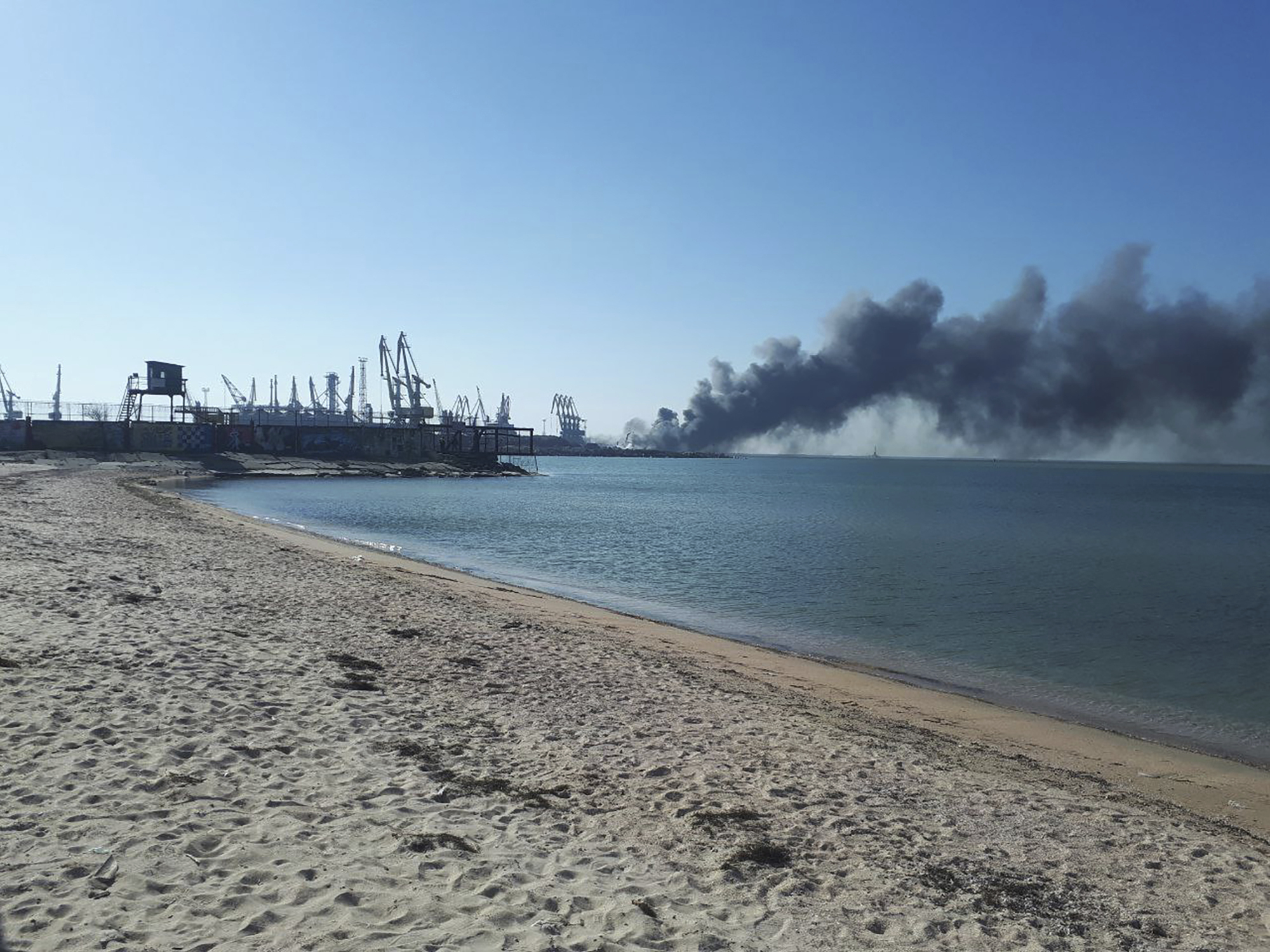
A ship is seen near the Pivdenny (Yuzhny) sea port outside Odessa, Ukraine, in 2016. (Photo: CGTN)
Fears are growing for the wellbeing of around 1,000 seafarers stuck on board foreign-flagged ships in Ukrainian ports. The sailors have been marooned since Russia took control of local waterways five weeks ago.
Food supplies on many vessels are thought to be running low, while their movement risks either being struck by missiles or veering into the path of unseen mines.
The United Nations (UN) has been pressing for the ships' safe passage but security risks and a game of blame and counter-blame between Russia and Ukraine is hobbling efforts.
UN shipping agency the International Maritime Organization (IMO) has been seeking in vain to create a safe maritime corridor enabling merchant ships and their crews to sail out of the Black Sea and Sea of Azov.

Ukraine's Black Sea ports have been the scene of some of the fiercest fighting. Ukraine's navy released this picture earlier in March claiming reporting that it had sunk the Russian ship Orsk in the Sea of Asov near the port city of Berdyansk. (Photo: AP)
"At present, the ongoing security risks preclude the option for ships to depart from ports in Ukraine," an IMO spokesperson told Reuters.
The International Chamber of Shipping (ICS), the world's principal shipping organisation, believes that the establishment of a 'blue' corridor is proving difficult because it needs both combatants' co-operation.
Russia told the IMO on Monday it had established an 80-mile long, three-mile wide, humanitarian maritime corridor to ensure safe passage from the Ukrainian ports of Chernomorsk, Kherson, Mykolaiv, Ochakov, Odesa and Yuzhne.
It called upon "competent authorities of the Ukraine" to provide vessels' safety.
The response from Ukraine's Maritime Administrations deputy head Victor Vyshnov was negative. "This is just a new sign of Russian propaganda," he said. "Due to the ongoing aggression against Ukraine, and Russian mine-laying activities at sea, no one can guarantee shipping safety in this region."
Fog of war
With the fog of war never far from proceedings, the Russian defense ministry counter-accused the Ukrainian Navy of placing nearly 420 mines at sea during the conflict's first two weeks.
In recent days Turkish and Romanian military diving teams have attempted to defuse stray mines.
The problem of ships' rations is growing, with the ICS saying some vessels "are in grave danger of running out of food in the coming days." It's attempting to deliver provisions to affected vessels.
The International Transport Workers' Federation (ITF), a trade union, agrees that the situation is grave. "Speaking to our members in Kyiv, there are days when there is no food at all, and there is no water… the same situation will apply to those ships stuck either in port or at anchor off the ports for fear of getting hit," said ITF general secretary Stephen Cotton.
In addition, five merchant vessels have been hit by projectiles, with one sunk, killing two seafarers.
Ukraine accuses Russia of using a Black Sea blockade as a diplomatic tool, by reducing the world's food supply.
U.S. Deputy Secretary of State Wendy Sherman backed the claim at Tuesday's UN Security Council briefing.
"Thirty percent of the world's wheat exports typically come from the Black Sea region, as does 20 percent of the world's corn and 75 percent of sunflower oil. But Russia has bombed at least three civilian ships carrying goods from Black Sea ports to the rest of the world, including one chartered by an agribusiness company," she said.
"The Russian Navy is blocking access to Ukraine's ports, essentially cutting off exports of grain. They are reportedly preventing approximately 94 ships carrying food for the world market from reaching the Mediterranean," Sherman added.
Global shipping authorities appear increasingly powerless to intervene to help free those stuck at sea.
In a statement on Monday, the IMO said it continues "to liaise closely with all key stakeholders in the region, and to contribute to attempts to address the safety and security of this situation."
Yet the issue seems no closer to being solved.


